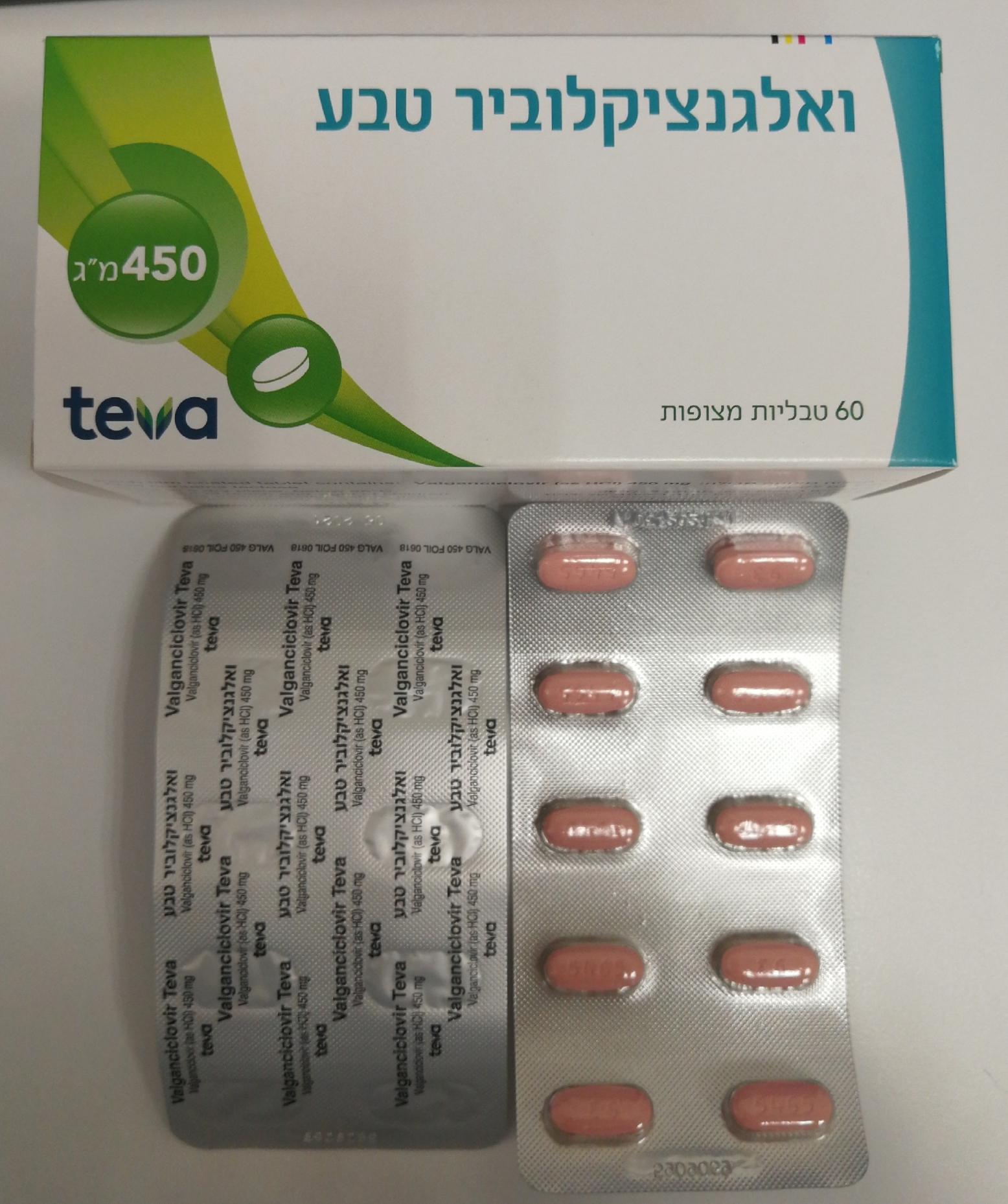Quest for the right Drug

ואלגנציקלוביר טבע ® VALGANCICLOVIR TEVA ® (VALGANCICLOVIR AS HYDROCHLORIDE)
תרופה במרשם
תרופה בסל
נרקוטיקה
ציטוטוקסיקה
צורת מתן:
פומי : PER OS
צורת מינון:
טבליות מצופות פילם : FILM COATED TABLETS
עלון לרופא
מינוניםPosology התוויות
Indications תופעות לוואי
Adverse reactions התוויות נגד
Contraindications אינטראקציות
Interactions מינון יתר
Overdose הריון/הנקה
Pregnancy & Lactation אוכלוסיות מיוחדות
Special populations תכונות פרמקולוגיות
Pharmacological properties מידע רוקחי
Pharmaceutical particulars אזהרת שימוש
Special Warning עלון לרופא
Physicians Leaflet
Special Warning : אזהרת שימוש
4.4 Special warnings and precautions for use Cross-hypersensitivity Due to the similarity of the chemical structure of ganciclovir and that of aciclovir and penciclovir, a cross-hypersensitivity reaction between these drugs is possible. Caution should therefore be used when prescribing Valganciclovir to patients with known hypersensitivity to aciclovir or penciclovir, (or to their prodrugs, valaciclovir or famciclovir respectively). Mutagenicity, teratogenicity, carcinogenicity, fertility, and contraception Prior to the initiation of valganciclovir treatment, patients should be advised of the potential risks to the foetus. In animal studies, ganciclovir was found to be mutagenic, teratogenic, carcinogenic, and a suppressor of fertility. Valganciclovir should, therefore, be considered a potential teratogen and carcinogen in humans with the potential to cause birth defects and cancers (see section 5.3). Based on clinical and nonclinical studies it is also considered likely that Valganciclovir causes temporary or permanent inhibition of spermatogenesis. Women of childbearing potential must be advised to use effective contraception during and for at least 30 days after treatment. Men must be advised to practice barrier contraception during treatment, and for at least 90 days thereafter, unless it is certain that the female partner is not at risk of pregnancy (see sections 4.6, 4.8 and 5.3). Valganciclovir has the potential to cause carcinogenicity and reproductive toxicity in the long term. Myelosuppression Severe leukopenia, neutropenia, anaemia, thrombocytopenia, pancytopenia, bone marrow failure and aplastic anaemia have been observed in patients treated with Valganciclovir (and ganciclovir). Therapy should not be initiated if the absolute neutrophil count is less than 500 cells/μl, or the platelet count is less than 25000/μl, or the haemoglobin level is less than 8 g/dl (see sections 4.2 and 4.8). When extending prophylaxis beyond 100 days the possible risk of developing leukopenia and neutropenia should be taken into account (see sections 4.2, 4.8 and 5.1). Valganciclovir should be used with caution in patients with pre-existing haematological cytopenia or a history of drug-related haematological cytopenia and in patients receiving radiotherapy. It is recommended that complete blood counts and platelet counts should be monitored regularly during therapy. Increased haematological monitoring may be warranted in patients with renal impairment and paediatrics, at a minimum each time the patient attends the transplant clinic. In patients developing severe leukopenia, neutropenia, anaemia and/or thrombocytopenia, it is recommended that treatment with haematopoietic growth factors and/or dose interruption be considered (see section 4.2). Difference in bioavailability with oral ganciclovir The bioavailability of ganciclovir after a single dose of 900 mg valganciclovir is approximately 60 %, compared with approximately 6 % after administration of 1000 mg oral ganciclovir (as capsules). Excessive exposure to ganciclovir may be associated with life-threatening adverse reactions. Therefore, careful adherence to the dose recommendations is advised when instituting therapy, when switching from induction to maintenance therapy and in patients who may switch from oral ganciclovir to valganciclovir as Valganciclovir Teva cannot be substituted for ganciclovir capsules on a one-to-one basis. Patients switching from ganciclovir capsules should be advised of the risk of over dosage if they take more than the prescribed number of Valganciclovir Teva tablets (see sections 4.2 and 4.9). Renal impairment In patients with impaired renal function, dosage adjustments based on creatinine clearance are required (see sections 4.2 and 5.2). Valganciclovir Teva film- coated tablets should not be used in patients on haemodialysis (see sections 4.2 and 5.2). Use with other medicines Seizures have been reported in patients taking imipenem-cilastatin and ganciclovir. Valganciclovir should not be used concomitantly with imipenem- cilastatin unless the potential benefits outweigh the potential risks (see section 4.5). Patients treated with Valganciclovir and (a) didanosine, (b) drugs that are known to be myelosuppressive (e.g. zidovudine), or (c) substances affecting renal function, should be closely monitored for signs of added toxicity (see section 4.5). The controlled clinical study using valganciclovir for the prophylactic treatment of CMV disease in transplantation, as detailed in section 5.1, did not include lung and intestinal transplant patients. Therefore, experience in these transplant patients is limited.
Effects on Driving
4.7 Effects on ability to drive and use machines No studies on the effects on ability to drive and use machines have been performed. Adverse reactions such as seizures, dizziness, and confusion have been reported with the use of Valganciclovir and/or ganciclovir. If they occur, such effects may affect tasks requiring alertness, including the patient's ability to drive and operate machinery.

פרטי מסגרת הכללה בסל
התרופה תינתן למניעת מחלה CMV במושתלי איברים שהינם CMV negative המקבלים תרומת איבר מתורם שהוא CMV positive.
שימוש לפי פנקס קופ''ח כללית 1994
לא צוין
תאריך הכללה מקורי בסל
15/04/2005
הגבלות
תרופה מוגבלת לרישום ע'י רופא מומחה או הגבלה אחרת
מידע נוסף
